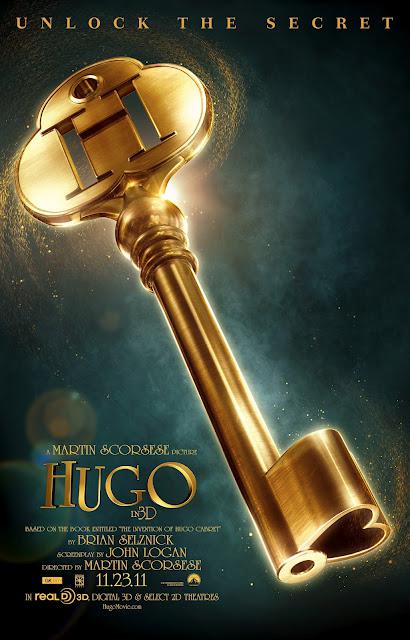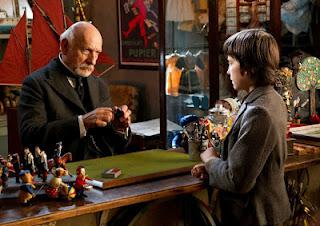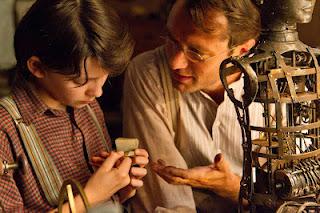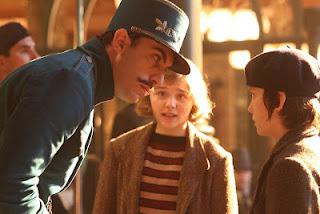By Murtaza Ali
Featured in IMDb Critic Reviews
 Hugo is an Oscar-winning motion picture directed by veteran American auteur, Martin Scorsese. With Hugo, Scorsese adds a whole new dimension to his oeuvre. Hugo takes a paradigm shift from Scorsese’s style of movie-making—usually driven by gore, gangsters and grotesquery—that has been his trademark for over four decades. While the violence and crime has made for subtlety and humor, Scorsese still manages to conjure up an aura of enchanting brilliance in Hugo. Like most of Scorsese’s works, Hugo is masterfully crafted, both on technical as well as emotional fronts. In other words, Scorsese once again succeeds in putting a soul into the movie by painting the canvas with colors of his vivid imagination. All this enriches Hugo with an aesthetic feel that greatly enhances its beauty.
Hugo is an Oscar-winning motion picture directed by veteran American auteur, Martin Scorsese. With Hugo, Scorsese adds a whole new dimension to his oeuvre. Hugo takes a paradigm shift from Scorsese’s style of movie-making—usually driven by gore, gangsters and grotesquery—that has been his trademark for over four decades. While the violence and crime has made for subtlety and humor, Scorsese still manages to conjure up an aura of enchanting brilliance in Hugo. Like most of Scorsese’s works, Hugo is masterfully crafted, both on technical as well as emotional fronts. In other words, Scorsese once again succeeds in putting a soul into the movie by painting the canvas with colors of his vivid imagination. All this enriches Hugo with an aesthetic feel that greatly enhances its beauty.
Ben Kingsley and Asa Butterfield in Hugo
In Hugo, Scorsese presents a tale of an orphan boy, Hugo Cabret, who is provided shelter by his drunkard uncle after the accidental death of his father (Jude Law). Hugo assists his uncle in keeping the clocks at the railway station running. Son of a clockmaker, Hugo is adept at fixing clockworks, and his predilection for pilfering mechanical parts in order to mend an automaton—that Hugo’s father was trying to repair before his untimely death— brings him face to face with a ruthless proprietor, Monsieur George (Ben Kingsley), who owns a toy store at the station. Monsieur George catches Hugo while the latter was trying to steal a toy from the former’s shop, and confiscates his belongings including a notebook—left by Hugo’s father—that seems to contain drawings of some mechanical prototypes. On observing the notebook, Monsieur George grows suspicious of Hugo, and inquires him about its source of origin. When Hugo refuses to oblige, Monsieur George threatens to hand him over to the Station Patrol. Hugo pleads to Monsieur George to return his notebook, but the latter threatens to burn it to ashes. Seeing his efforts go in vain, Hugo follows Monsieur George all the way to the latter's home where he gets acquainted with Monsieur George's amiable goddaughter, Isabelle. What ensues is an adventurous journey, which would help unravel the mysteries associated with Monsieur George's obscure, albeit decorated past, and its connection to Hugo's.
Jude Law in Hugo (Right)
Like Woody Allen in Midnight in Paris, Scorsese too chooses the inter-war Paris as the movie’s backdrop, but unlike Allen, Scorsese’s love for Paris seems rather unbiased, as he chooses to represent the city of love in the microcosm of an ever bustling railway station, occasionally punctuated by quick bursts of joy and sadness. Scorsese uses the movie as a medium to pay tribute to the unsung heroes, the likes of Lumiere Brothers, Georges MĂŠliès and numerous other pioneers, who crafted the beautiful world of cinema through their vision, tenacity and hard work. Hugo succeeds in capturing the true beauty and wonder of cinema, as a vicarious medium, which has the power to catapult the viewer into the realm of the unimaginable and the inexpressible. Hugo is a testament to Martin Scorsese’s adaptability and versatility as a movie maker, who doesn’t leave a single stone unturned in order to conquer the last front: making a foray into a genre that's exactly opposite to his forte. Vintage Scorsese, Hugo simultaneously serves to be an emotional drama as well a visual spectacle.
A Still from Hugo
Almost everyone in the cast gives a memorable performance with special mention of Asa Butterfield who is a treat to watch as Hugo Cabret, and Ben Kingsley who uses his thespian experience to emote with remarkable levels of maturity and panache that’s seldom demonstrated by contemporary actors. The movie’s background score, cinematography, and editing are all top-notch, and brilliantly complement Scorsese’s inspired and imaginative direction. Hugo presents movie making at its absolute best, and is a must watch for everyone across all age groups. 10/10Readers, please feel free to share your opinion by leaving your comments. As always your feedback is highly appreciated! For more information on the title, please click on the following links:IMDb
Wikipedia
Hugo Trailer
...
Previous Review: The Prestige (2006)Next Review: Quantum of Solace (2008)
